Edition: 19 to 30 June 2023
PARTNERSHIP
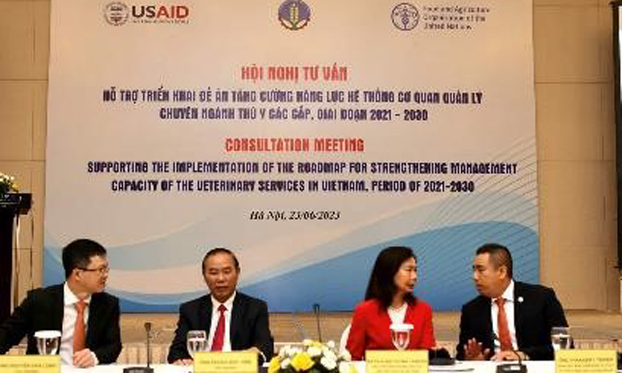 ©FAO Viet Nam | VIET NAM The launch of a national strategy to develop veterinary service system The Ministry of Agriculture and Rural Development has collaborated with FAO to organize a consultation workshop on 11 June 2023 to launch the national strategy to develop the specialized veterinary management system in Viet Nam at all levels from 2021–2030; thanks to the United States Agency for International Development (USAID) for their strong support. Thanawat Tiensin, Director of FAO’s Animal Production and Health Division, participated in the workshop and recommended some solutions for Viet Nam to adapt to the increasing market requirements. FAO ECTAD Senior Technical Coordinator Pawin Padungtod also shared his view on FAO’s One Health approach and enhancing veterinary management in Viet Nam. Read the news here. |
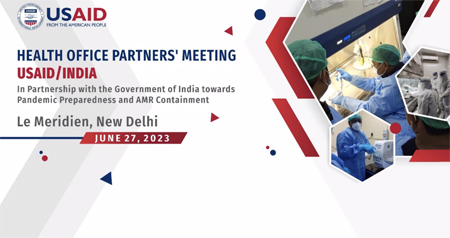 ©USAID | INDIA Participation in USAID health partners’ meeting FAO participated in the USAID India's Health Office partners' meeting on 27 June 2023, where FAO's previous and ongoing efforts to support the Government of India were showcased, including the establishment of the India Network of Fisheries and Animal Antimicrobial Resistance, development of a protocol on estimating antimicrobial use at the farm level, contributions to the animal health component of National Action Plan 2.0, publication of the National Framework on One Health, and the identification of research priorities at the human-animal interface. Future activities under India's forthcoming Global Health Security Program were also mentioned. This includes initiatives on the following themes: antimicrobial resistance, zoonoses, national laboratory system, surveillance, human resources (such as establishing the Field Epidemiology Training Program for Veterinarians (FETPV)) and the establishment of FAO ECTAD India. |
ONE HEALTH
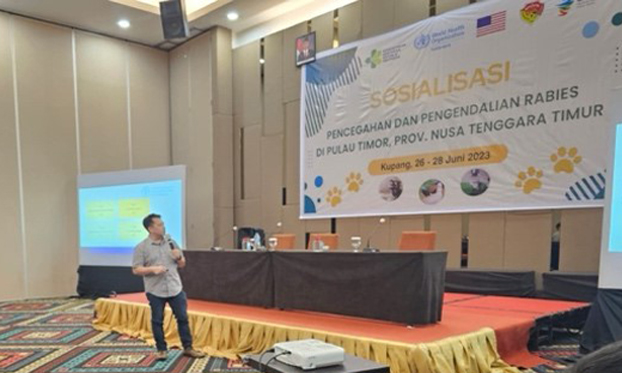 ©FAO/Wahid Husein | INDONESIA Sharing information following the rabies outbreak in East Nusa Tenggara Over the last two years, the number of dogs being vaccinated against rabies has declined substantially on Flores Island, East Nusa Tenggara, due to COVID-19. It led to a rise in rabies cases in animals and humans on the island. Early this year, rabies was identified on Timor Island, possibly from dogs transported from Flores. FAO, therefore, shared its experiences on rabies control in a seminar held by the Indonesian Ministry of Health and World Health Organization (WHO) on Timor Island from 26 to 28 June 2023. More than 60 participants from various local animal and human health sectors discussed lessons learned from FAO’s rabies control programme, management of bite cases from suspected rabid animals and management of patients with signs of rabies. FAO also conveyed the importance of mass dog vaccination and Integrated Bite Case Management to respond to outbreaks, and advised against responding to rabies outbreaks with dog culling. Participants were expected to share the information with their network, including the need to form rabies centres, manage community mobilization to report cases and carry out vaccinations, and facilitate a rabies communication forum with a One Health approach. |
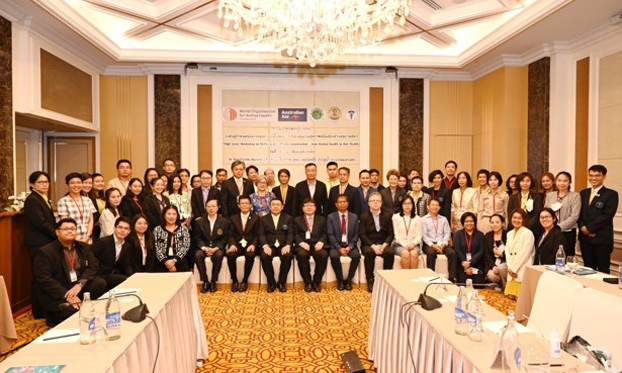 ©FAO/DLD | ASIA AND THE PACIFIC High-level workshop on national One Health coordination: from animal health to One Health in Thailand The Department of Livestock Development (DLD) in Thailand, under close collaboration with the Thai Veterinary Medical Association under Royal Patronage, organized the high-level workshop on national One Health coordination: from animal health to One Health from 26 to 27 June 2023 in Bangkok. The meeting discussed the development of and sought a way forward for, the One Health approach in the animal health sector to coordinate efficiently with the Coordinating Unit for One Health under the Department of Disease Control. The Tripartite (FAO, WHO and World Organisation for Animal Health (WOAH)) regional offices and representatives from disease control, laboratory, aquatic, fishery, forestry, environmental and other relevant sectors and partners participated in the event. |
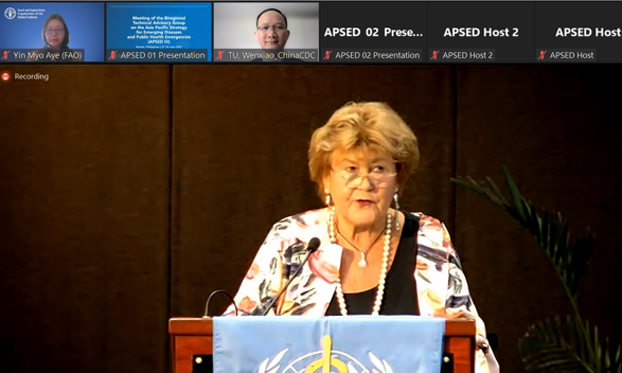 ©FAO/Yin Myo Aye | ASIA AND THE PACIFIC Draft Asia-Pacific Health Security Framework by WHO FAO participated in the bi-regional technical advisory group meeting on the Asia-Pacific Strategy for Emerging Diseases and Public Health Emergencies (APSED III), which was organized as a hybrid meeting in the Philippines from 27 to 29 June 2023. Since 2006, three iterations of the APSED have guided efforts to implement the revised International Health Regulations (IHR) (2005) and strengthen capacities to detect and respond to public health emergencies in the WHO South-East Asia and Western Pacific regions. FAO provided inputs into the draft Asia-Pacific Health Security Framework that builds on APSED III as a regional approach and mechanism to implement and advance IHR (2005) core capacities, thematic priorities and health security. |
ANTIMICROBIAL RESISTANCE (AMR)
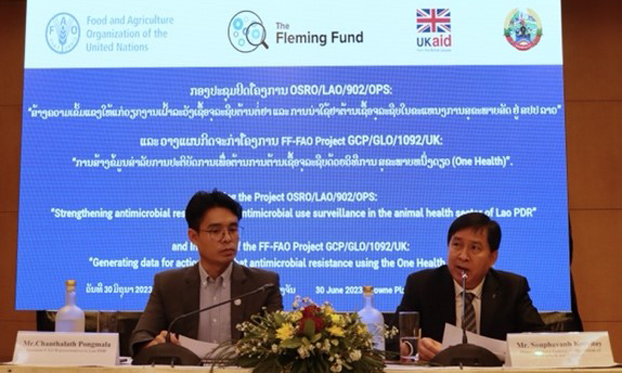 ©fao/Bounmee Maokhamphiou | LAO PEOPLE'S DEMOCRATIC REPUBLIC Moving together towards controlling AMR in humans and animals: the second phase of the AMR project funded by UK Aid FAO announced the second phase of the AMR project on strengthening AMR and antimicrobial use (AMU) surveillance in the animal health sector on 30 June 2023. The first phase was started in 2019, a four-year collaboration with the Department of Livestock and Fisheries, thanks to the generous contribution from the United Kingdom Agency for International Development (UK Aid). The project has supported the government in strengthening the capacity of laboratory staff in detecting AMR in the livestock sector, hosted two national symposia on AMR and AMU for knowledge exchange under the One Health approach and established the National Antimicrobial Resistance Control Committee to oversee and provide guidance on the implementation of the activities related to AMR and AMU. Throughout its four-year implementation, the project also assessed the capacity of the National Animal Health Laboratory (NAHL) and conducted relevant training to build capacity. Support was given to NAHL to maintain an up-to-date AMR database. Epidemiological analysis of the AMR data was undertaken and reported to policymakers, among other outputs. Read the news here. |
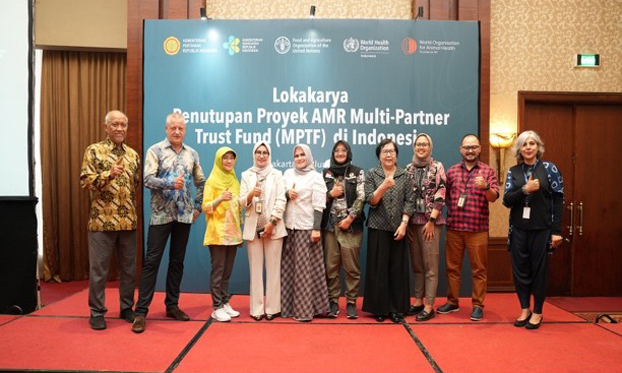 ©FAO/Eko Prianto | INDONESIA The project on strengthening the AMU system concludes The Indonesian government and the Tripartite completed the AMR Multi-Partner Trust Fund (MPTF) project in Indonesia on 27 June 2023. The project assisted Indonesia in controlling AMR with the One Health approach by strengthening the system for AMU and AMR reduction in critical sectors for human and animal health. The project has helped the government in encouraging the implementation of the 2020-2024 National Action Plan for AMR Control in Indonesia and improving the AMR resilience system through One Health. FAO Representative for Indonesia and Timor-Leste, Rajendra Aryal hopes that all stakeholders can sustain the efforts made under this project and continue controlling AMR while proposing novel and innovative approaches to overcome new challenges. Read the news here. |
-of-animal-pathogens.jpg?sfvrsn=7a65ea8f_1) ©FAO/Juan Carrique-Mas | VIET NAM Consultation workshop for the laboratory network for diagnosis and antimicrobial susceptibility testing (AST) of animal pathogens A consultation workshop for the network of laboratories conducting diagnosis and AST of pig and poultry bacterial pathogens was held on 26 June 2023 in Ho Chi Minh City. The workshop, co-organized by FAO and Viet Nam's Department of Animal Health and funded by USAID, included the participation of the ten laboratories conducting bacterial diagnostic and susceptibility testing work, including government, private and university laboratories. This important initiative is aimed at improving Viet Nam animal pathogens' AST testing capacity, leading to better antimicrobial prescription practices for individual farms and long-term AMR monitoring of pig and chicken pathogens at the country level. This initiative built on the success of the existing national network for monitoring AMR in Escherichia coli, Salmonella and Campylobacter in pigs and chickens. |
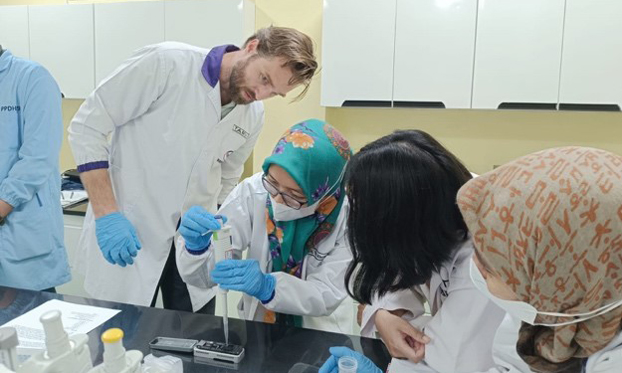 ©FAO Indonesia | INDONESIA Scaling up laboratory testing capacity for AMR FAO and the National Veterinary Drug Assay Laboratory (BBPMSOH) rolled out Oxford Nanopore technologies from 20 to 23 June 2023, aiming to monitor antibiotic resistance genes (ARGs) in probiotics in Indonesia. Bacillus probiotics are the most often registered probiotics used in feed for livestock in the country, and this study will support the government to ensure probiotics registered do not contain ARGs that are transferable to pathogens in animals and to environment. Nanopore is the whole genome sequencing technology that provides direct, real-time, long reads, portable and comprehensive genomic analysis. The cost of testing per sample is also lower compared to other technologies. It was trialed in the National Laboratory for Quality Control and Certification of Animal Product (BPMSPH) as an AMR surveillance tool in 2019. Thanks to USAID funding, FAO continues to support the government in providing access to new technologies to improve laboratory capacities in Indonesia. |
AFRICAN SWINE FEVER (ASF)
-continues.png?sfvrsn=625de25a_1) ©FAO RAP | ASIA AND THE PACIFIC Work on refining community ASF biosecurity interventions (CABI) continues The CABI programme was successfully piloted in a village in North Cotabato, the Philippines, in 2022. This led to the planned expansion of using CABI in other areas of the Philippines, and in four other Southeast Asian countries. Participants from Cambodia, Lao People’s Democratic Republic, Indonesia, the Philippines and Thailand met from 27 to 29 June 2023 in the Philippines to assess the applicability of protocols developed in implementing CABI. They also discussed the feasibility of data needed for CABI’s impact assessment. Partners from the North Cotabato local government unit, regional veterinary quarantine officers and PhilVet Health Services shared their experiences and insights in piloting CABI in the Philippines. USAID’s Bureau for Humanitarian Assistance and the Republic of Korea’s Ministry of Agriculture, Food and Rural Affairs fund this programme. |
EPIDEMIOLOGY
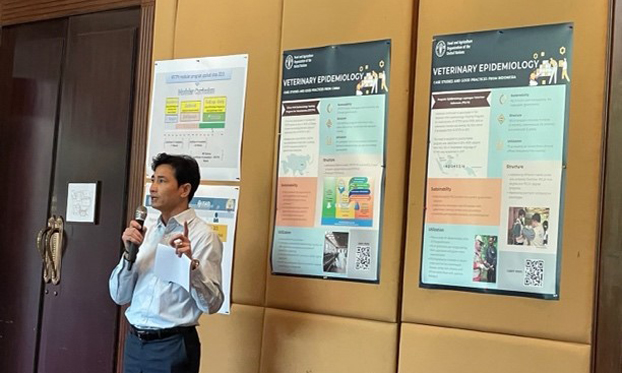 ©FAO/Wantanee Kalpravidh | ASIA AND THE PACIFIC Veterinary epidemiology training for executives |
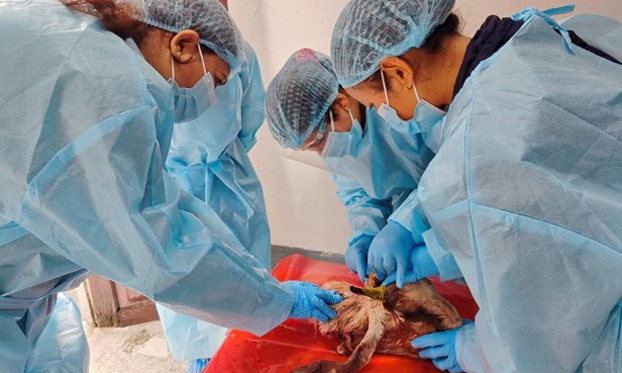 ©FAO/Surendra KarkI | NEPAL Training to bolster animal disease surveillance FAO conducted a two-day training on sample collection, dispatch and epidemiological reporting at the Central Veterinary Laboratory from 29 to 30 June 2023. Animal health technicians working at the livestock services section of different municipalities within Kathmandu Valley participated in the training. The Department of Livestock Services Director-General Samjhana Kumari Kafle distributed the necessary supplies for sample collection to the participating municipalities. The training was conducted in collaboration with the Department of Livestock Services and Central Veterinary Laboratory, Tripureshwor with funding support from USAID. |
RISK REDUCTION
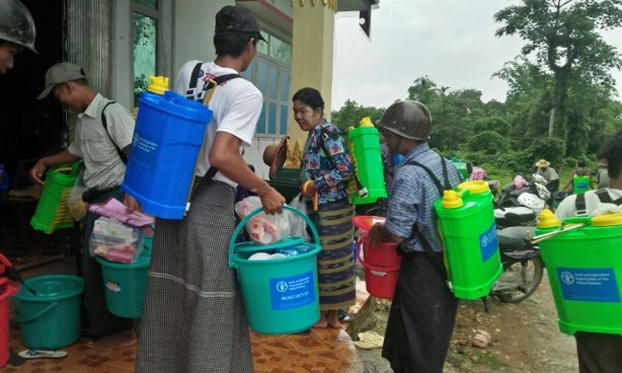 ©FAO MYANMAR | MYANMAR FAO and USAID improve biosecurity and disease management of 1000 farmers Thanks to USAID, FAO has been supporting farmers to improve farm biosecurity and disease management by providing biosecurity kits and training at the community level in Ayeyarwady region. In total 1000 farmers and actors along the poultry and pig value chains have received the kits, including disinfectant, sprayer and PPE and training on basic principles of farm biosecurity, instructions on cleaning and disinfection and effective use of disinfectant. In addition, private veterinarians were also involved in training of trainers to support farmers in implementing biosecurity measurements at farms. FAO continues to support farmers in Myanmar to prevent animal disease outbreaks, protect livelihoods and improve food security. |
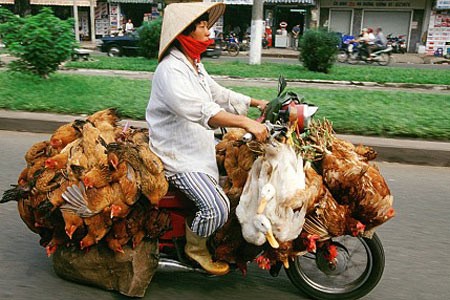 ©FAO | ASIA AND THE PACIFIC Presenting FAO’s work on disease reduction along the value chain FAO delivered a lecture on the linkage between the trade of livestock and poultry in Asia and its associated disease risks at the Mekong One Health Innovation Program led by Michigan State University in April 2023. The lecture highlighted an example of the increased risks of highly pathogenic avian influenza virus infection in humans and poultry due to the massive movement of people and food, including animal products, during Lunar New Year. FAO and Member Nations have been working together to mitigate the risk of animal diseases along the value chain by raising awareness during high-risk periods, building capacity on value chain analysis and risk assessment and enhancing virus detection by investing in new technologies and innovations. These actions are part of FAO's efforts under the USAID-funded programmes. |
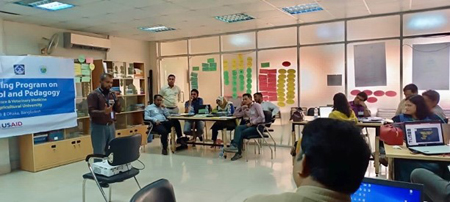 ©FAO BANGLADESH | BANGLADESH Pedagogy training to improve teaching practices in veterinary schools |
LABORATORY
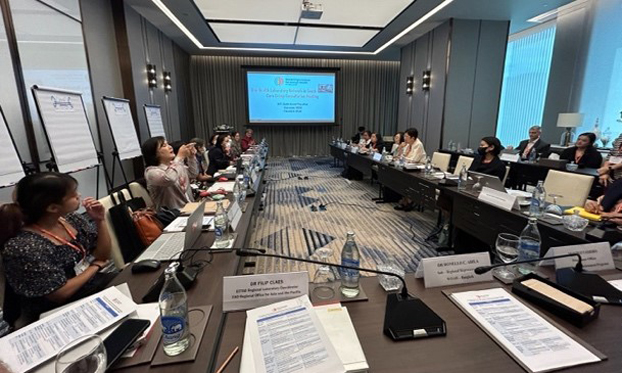 ©FAO/Filip Claes | ASIA AND THE PACIFIC Participation in Southeast Asia’s One Health laboratory network consultation meeting FAO participated in the One Health laboratory network in Southeast Asia core group consultation meeting hosted by WOAH on 27 June 2023 in Bangkok. Animal and public health laboratory experts from around the region mapped One Health laboratory activities, identified areas of collaboration, and made recommendations for a One Health laboratory network in the region. Each invited laboratory had an opportunity to present their activities in their respective fields, including public health, food safety, AMR and AMU monitoring, emerging infectious diseases and wildlife. |
